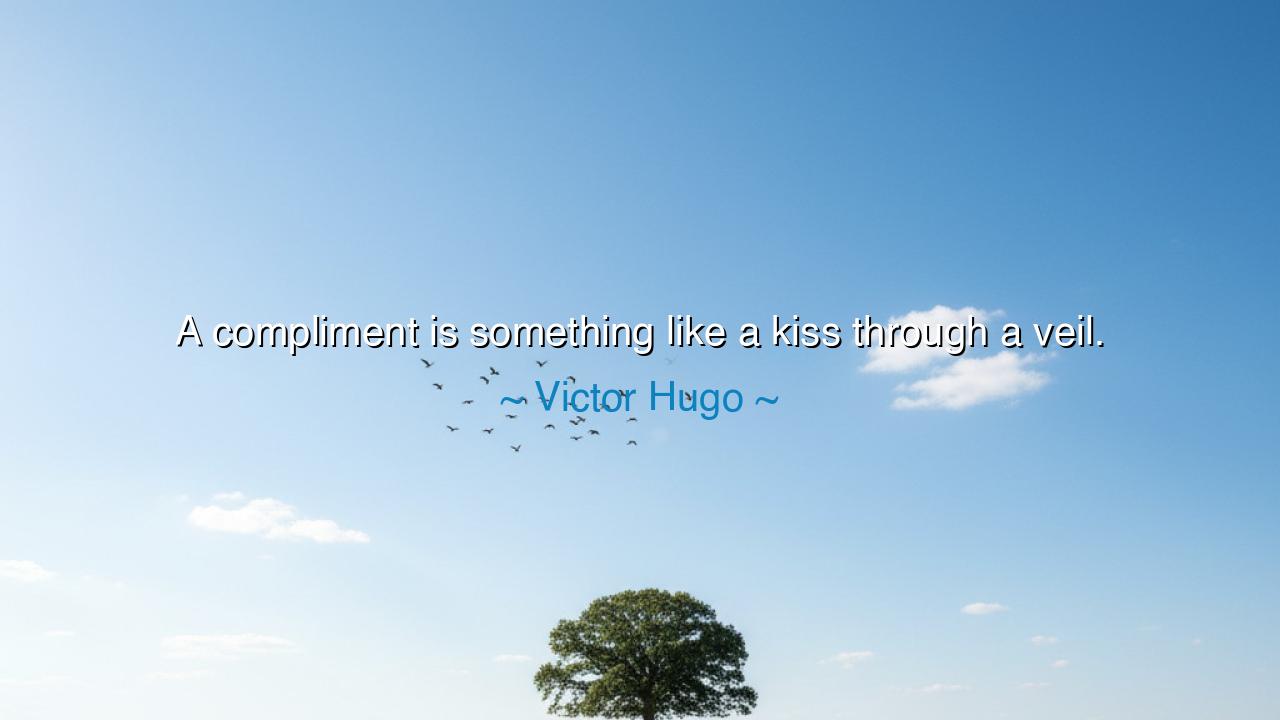
A compliment is something like a kiss through a veil.






“A compliment is something like a kiss through a veil.”
Thus spoke Victor Hugo, the titan of French literature, whose words danced between passion and philosophy, whose pen pierced through the human heart as lightning through cloud. In this tender and elegant image, Hugo unveils the nature of praise, of admiration, and of the delicate distance between souls. A compliment, he says, is like a kiss through a veil — it carries warmth, affection, and grace, yet it is softened, restrained, touched with modesty. It is a gesture that both reveals and conceals — revealing esteem, yet concealing desire; offering beauty, yet preserving dignity.
Victor Hugo lived in an age of sentiment and formality, when emotion was not shown in raw outburst, but through the refined language of civility and art. His works — from Les Misérables to The Hunchback of Notre-Dame — reveal his deep understanding of the human soul’s hunger for recognition, love, and respect. When he wrote these words, he was speaking not merely of social grace, but of human connection itself — that mysterious exchange of hearts which, though often veiled, nourishes the spirit like sunlight filtered through silk. The compliment, for Hugo, is not a mere politeness of speech; it is an art of the soul, a way of saying, “I see the beauty in you,” without transgressing the boundaries of respect.
A kiss through a veil is, by its nature, restrained but intimate. It acknowledges closeness while honoring distance — the perfect harmony of passion and propriety. So too with a compliment: it must be sincere, yet subtle; heartfelt, yet humble. When given rightly, it uplifts both giver and receiver. It is not flattery, which is hollow and self-serving, but genuine recognition — a gift of spirit. The wise have always known that the power of words lies not only in what is said, but in how it is said. A compliment that is too forward wounds modesty; one that is false wounds truth. But a sincere compliment, wrapped in gentleness and grace, is like a ray of light passing through a veil — it warms without burning, it illuminates without blinding.
Consider the story of Eleanor Roosevelt, a woman of quiet dignity and unshakable strength. Though she moved among the powerful, she was known for the way she made others — rich or poor, known or forgotten — feel valued. Her compliments were never exaggerated, but always true. She would notice a worker’s care in his craft, or a child’s courage in speaking, and her words would touch the heart like a gentle kiss through cloth — unseen by the world, but deeply felt by the soul. Through that subtle art, she built bridges where walls had stood, reminding us that the smallest words of recognition can heal and inspire.
In this way, Hugo’s metaphor becomes a teaching about the mystery of kindness. Human connection requires tenderness; raw emotion, like an uncovered flame, can consume rather than comfort. A compliment given with sincerity and restraint allows affection to breathe within the bounds of respect. It keeps the exchange pure, unmarred by self-interest or excess. In a world too often loud with empty praise or silence hardened by pride, the gentle art of a true compliment is a rare and noble grace — a spiritual courtesy that ennobles both hearts.
The lesson, then, is to speak with intention and feeling. Let your words be like the kiss through the veil — gentle, modest, and real. Do not flatter to gain favor, nor withhold praise out of coldness. See beauty where others overlook it, and name it with kindness. A compliment, when sincere, is a blessing — a way to tell another soul, “You are seen, you are valued, you are worthy.” It is the quiet alchemy that turns strangers into friends, and friends into kin of the heart.
So remember, my child of word and wonder: in a world where noise abounds, let your speech be music. Praise softly, but truthfully. Do not fear to honor what is good in others, but do so with the reverence of one who touches something sacred. For as Victor Hugo reminds us, a compliment is not mere speech — it is a kiss through a veil, an act of grace that allows affection to live in purity, truth to shine with gentleness, and love to speak, even when the lips dare not.






AAdministratorAdministrator
Welcome, honored guests. Please leave a comment, we will respond soon